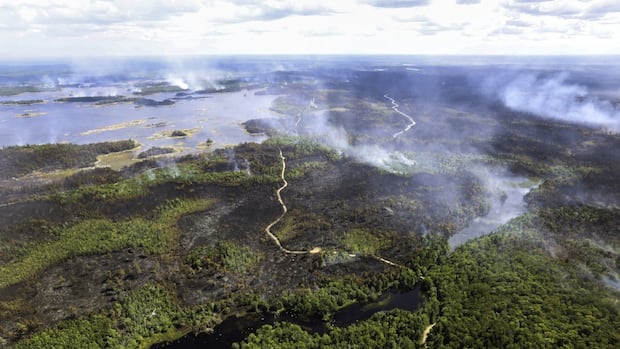The Long Lake wildfire in Annapolis County set a Nova Scotia record for air quality warnings and advisories, according to Environment Canada.
Annapolis County went from Aug. 14 to Sept. 8 under a warning or advisory, a span of 26 days. That’s double the previous number for Nova Scotia, the national forecaster says.
The Long Lake fire continues to burn, but is no longer out of control.
Before this summer, the longest stretch was 13 consecutive days of special air quality statements in 2023 due to wildfires across the province. That stretch began on May 28 and ended on June 9.
It was a year that marked the most damaging wildfire season in the province, burning more than 25,000 hectares of land and 200 homes.
That year, Environment Canada only issued special air quality statements. The agency started a two-tier air quality alert system in 2024 for all of Canada.
With the two-tier system, an air quality rating between seven and 10 warrants a special air quality statement, while one listed as 10+ will be marked with an air quality warning.
The air quality health index measures air quality in relation to health. The higher the number, the higher the health risk.
Difficult weeks
Tanya Olscamp lives in Middleton in the northeast part of the county. She said it was uncomfortable to go outside during the worst of the burning and the smell of smoke permeated her home.
“One evening I had the window open … and then sometime in the morning hours, the smoke was so bad I thought my house was on fire,” she said. “I’ve never experienced anything like that and I’ve lived here my entire life.”
The last few weeks got so difficult that Olscamp’s asthma, which she said was previously under control, started acting up. She had to get an inhaler.
Expert says exposure increases health risk
Dr. Jean Bourbeau, a professor in McGill University’s department of medicine, focuses on respiratory illnesses, particularly chronic obstructive pulmonary disease, or COPD.
He said the wildfires contain fine particulates that can travel thousands of kilometres on the wind.
The fine particulates “are now recognized as being even more toxic when they are coming from wildfire than when they are coming from other sources of pollution,” Bourbeau said.
When people are exposed to wildfire smoke, the fine particulates can cause systemic inflammation.
This can cause sudden, acute health conditions, but Bourbeau said there is increasing evidence to suggest that prolonged exposure to wildfire smoke can cause chronic health problems.
“Being exposed for longer periods of time with these wildfires, we have data suggesting that the people will be more inclined to develop lung conditions like a smoker might develop,” he said.
Bourbeau added that in the short term, people should avoid going outdoors when air quality is impacted by smoke and contact their doctors if they have any respiratory or cardiac conditions they may need to manage while dealing with the smoke.
He said wildfire prevention is key in the long term.







